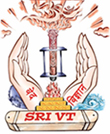 info.srivt@gmail.com
info.srivt@gmail.com 08632950470 / 08634010911 / 9493936388
08632950470 / 08634010911 / 9493936388
The foundation of India culture is based on the Sanskrit language. There is a misconception about the Sanskrit language that it is only a language for chanting mantras in temples or religious ceremonies. However, that is less than 5% of the Sanskrit literature. More than 95% of the Sanskrit literature has nothing to do with religion, and instead it deals with philosophy, law, science, literature, grammar, phonetics, interpretation etc. In fact Sanskrit was the language of free thinkers, who questioned everything, and expressed the widest spectrum of thoughts on various subjects. In particular, Sanskrit was the language of our scientists in ancient India. Today, no doubt, we are behind the Western countries in science, but there was a time when India was leading the whole world in science. Knowledge of the great scientific achievements of our ancestors and our scientific heritage will give us the encouragement and moral strength to once again take India to the forefront of science in the modern world.
The word `Sanskrit’ means “prepared, pure, refined or prefect”. It was not for nothing that it was called the `devavani’ (language of the Gods). It has an outstanding place in our culture and indeed was recognized as a language of rare sublimity by the whole world. Sanskrit was the language of our philosophers, our scientists, our mathematicians, our poets and playwrights, our grammarians, our jurists, etc. In grammar, Panini and Patanjali (authors of Ashtadhyayi and the Mahabhashya) have no equals in the world; in astronomy and mathematics the works of Aryabhatta, Brahmagupta and Bhaskar opened up new frontiers for mankind, as did the works of Charak and Sushrut in medicine. In philosophy Gautam (founder of the Nyaya system), Ashvaghosha (author of Buddha Charita), Kapila (founder of the Sankhya system), Shankaracharya, Brihaspati, etc., present the widest range of philosophical systems the world has ever seen, from deeply religious to strongly atheistic. Jaimini’s Mimansa Sutras laid the foundation of a whole system of rational interpretation of texts which was used not only in religion but also in law, philosophy, grammar, etc. In literature, the contribution of Sanskrit is of the foremost order. The works of Kalidas (Shakuntala, Meghdoot, Malavikagnimitra, etc.), Bhavabhuti (Malti Madhav, Uttar Ramcharit, etc.) and the epics of Valmiki, Vyas, etc. are known all over the world. These and countless other Sanskrit works kept the light of learning ablaze in our country up to modern times.
Join us as member to make again our Bharat as "Viswa Guru"
Srimaharshi Aarshavijnanadi Gurukula Mahavidyalaya (Virtual University)


